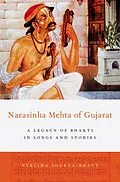Exploring medieval manuscripts, Gandhi's writings, and performances in multiple religious and non-religious contexts, Narasinha Mehta of Gujarat demonstrates how over five centuries, performers and audiences of devotional songs and hagiographic narratives associated with the saint-poet Narasinha Mehta have sculpted them into popular sources of moral inspiration. Taking Gandhi's use of these works in his social reconstruction programs as an example, the book suggests that when religious forms such as songs and hagiographies of saint-poets of South Asia acquire dimensions of popular culture, they offer a platform for communication among diverse groups. An illuminating study that provides a vivid picture of the Narasinha tradition, Narasinha Mehta of Gujarat will be a crucial resource for anyone seeking to understand the power of religious performative traditions in popular media.
Autorentext
Neelima Shukla-Bhatt is Associate Professor of South Asia Studies at Wellesley College.
Inhalt
List of Illustrations Acknowledgments Preface Note on transliteration Introduction Part I - Devotion and Aesthetics in the Narasinha Tradition 1. Lyrics of Play - Krishna in the Human World 2. Lyrics of Awakening - Mysticism and Moral Reflection 3. Exemplary Bhakti, Exemplary Singing - Narasinha in Sacred Narratives 4. Singing as Bhakti - Musical Performances of Narasinha's Songs Part II - The Narasinha Legacy in Religious and Popular Cultures 5. The Saint of the Threshold, the First of Poets - The Narasinha Tradition in Gujarat and Beyond 6. A Saint-poet in the Making of a Mahatma - Narasinha Mehta and Gandhi 7. Songs and the Saint in Modern Media - Narasinha in Popular Culture Concluding Remarks Glossary Notes Bibliography Index
